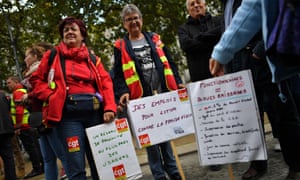
A demonstrator in Nantes holds a sign saying ‘I am a slacker’ during a protest called by several French unions against the labour law reform.
Photograph: Loic Venance/AFP/Getty Images
France
‘Slackers’ take to streets in protest at Macron’s labour law reforms
Demonstrators seize on president’s use of word ‘lazy’ as rallying slogan for protests in Paris and other big cities
Demonstrators and trade unionists have taken part in mass street protests across France against Emmanuel Macron’s overhaul of labour laws – the first strike action to face the new president.
The leftwing CGT union, France’s second biggest, called 4,000 strikes and protests on Tuesday, with public sector workers, train staff and energy sector workers joining. Transport was disrupted in Nice, but in Paris delays were limited to two commuter lines. The Irish low-cost carrier Ryanair cancelled flights, but other airlines, high-speed trains and Eurostar trains ran as normal.
On the edge of the Paris street protest, police fired teargas after a large group of masked men dressed in black briefly threw projectiles.
The day of protest was the first test of whether opposition to Macron’s pro-business plans to loosen labour rules, which would make it easier for companies to hire and fire, could bring demonstrators on to the streets. The new president was determined to face down any opposition.
The word “lazy” swiftly became the rallying slogan of anti-Macron demonstrators at Tuesday’s street protest in Paris as well as rallies in cities such as Nice, Marseille, St-Nazaire and Caen, where some shouted: “Lazy slackers unite.”
The turnout – which was lower than last year’s demonstrations against the Socialist president François Hollande’s labour law changes – will serve as a yardstick for trade unions’ ability to mobilise against Macron. Deep splits have emerged in the labour movement between those determined to fight the reforms and those prepared to compromise. Crucially, other top unions in France did not take part in the protests, which comforted the government.
Macron, a 39-year-old former investment banker and centrist who was elected in May against the far-right Marine Le Pen, is seeking to style himself as a pro-business reformer who would never give in to street protests. His labour law changes are being fast-tracked through parliament by executive orders.
A row broke out this weekend over Macron’s strong language after he said in a speech in Athens that he would “not yield anything, either to the lazy, the cynics or the extremes”.

“Exhausted, angry … but not lazy,” read a placard carried by Valérie, 50, a health assistant from outside Paris. “I’m not against reforms per se, but we don’t want protections stripped away so people are forced into precarious, low-wage jobs like they are in Britain or Germany. My grandparents and great-grandparents fought to have social security, to get rights which are now being stripped away. This is about protecting the French social model.”
Protesters take to streets of Paris against Macron’s labour reforms
The leftist MP Jean-Luc Mélenchon, who will lead a separate demonstration on 23 September, joined a protest in the southern port city of Marseille where he said France did not want unbridled economic liberalism. “France isn’t Britain,” he added.
Pauline Forest, 25, a master’s student at university in Versailles, demonstrating in Paris with her students’ union, said: “These old free-market approaches, which haven’t changed since Margaret Thatcher, don’t work any more and people don’t want it.”
André Delattre, a retired secondary school teacher, carried a sign warning that “the lazy” were taking to the streets. “Tidy up labour law by all means but not by giving all the advantages to the boss class. Macron is not listening now, but his big fear is young people taking to the streets, and he would listen then,” Delattre said.
Macron – who is keen to avoid street protests spreading to other proposed, contentious changes including to the pensions system, unemployment benefits and training schemes – said last month that the French people “hated reforms”, but that he was proposing a “transformation” to fire up the country’s economy and make it a leader in Europe. In Athens last week, he lamented that France “is not open to reforms … We rebel, we resist, we circumvent. This is what we are like.”

Macron is facing street demonstrations sooner after taking office than any other recent French leader. This is in part because his labour law changes are being pushed through parliament with record speed using executive orders. The new laws include a cap on payouts for unfair dismissals and greater freedom for employers to hire and fire. The new labour rules will affect all private sector workers in France, but not public sector workers. But state workers made up the largest number of CGT union demonstrators on Tuesday, who warned that the government was also planning “crushing” public sector cuts.
The prime minister, Edouard Philippe, insisted the street protests would not result in any changes to the new laws. He said the new labour laws had been spelled out to voters before the presidential and parliament elections as the solution to France’s mass-unemployment problem. Joblessness, currently at 9.5%, is about twice that of Britain or Germany.
So far, the Élysée seems confident it can face down protests, in part because opposition is fragmented. Macron’s new political grouping, La République En Marche, controls parliament. The next biggest party on the right is bitterly divided. Although some other trade unions were critical of the labour law changes – despite a consultation period – no other leaders of big unions joined the CGT street demonstrations on Tuesday. Crucially, the CFDT, which is now France’s biggest union, did not officially take part, even if a handful of its members joined the Paris protest.
Opinion polls show voters do not like the labour reforms overall but back many of its individual measures, including direct negotiations between bosses and their staff in small firms.
Over the summer, Macron’s popularity slipped, with recent polls showing that only around 40% of French voters are satisfied with his performance in office. Analysts attribute the disaffection to a mix of communication problems and political missteps in which his initial measures on tax and reforms were seen as muddled and unfair, benefiting the rich more than the poor.